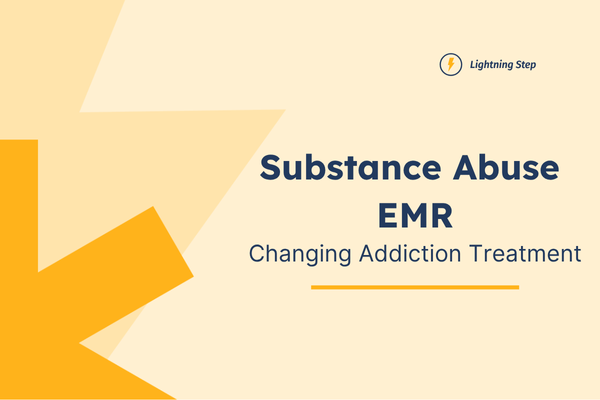
Addiction treatment centers face mounting pressure to deliver better outcomes while managing complex documentation requirements. Traditional electronic health records weren't built for the unique needs of behavioral health providers. But substance abuse EMR software is changing the game. AI-driven tools and specialized platforms are transforming how clinicians track patient progress, manage care plans, and prevent relapse.
Generic electronic health records fell short for addiction treatment providers. They lacked integrated screening tools, specialized care planning features, and secure messaging capabilities that behavioral health clinics needed.
Purpose-built substance abuse EMR software addresses these gaps. These systems include built-in addiction severity assessments, treatment plan templates, and group therapy scheduling. They handle complex billing requirements for behavioral health services and maintain detailed substance use histories.
The results speak for themselves. Clinicians spend less time on documentation and more time with patients. Compliance reporting becomes automated. Patient engagement improves through integrated communication tools and treatment tracking features.
Remote therapy sessions now launch directly from EMR platforms. Clinicians can conduct video sessions, take notes, and update treatment plans without switching between applications. This integration streamlines workflows and maintains comprehensive patient records.
Mobile apps connected to EMR systems allow real-time patient check-ins. Patients report mood levels, cravings, and medication adherence through smartphone interfaces. This data flows directly into clinician dashboards for immediate review.
Smartwatches and biosensors capture sleep patterns, stress levels, and vital signs around the clock. This continuous monitoring provides clinicians with objective data about patient wellbeing between appointments.
Automated data feeds eliminate manual entry errors. When a patient's stress levels spike or sleep patterns change, the system triggers alerts for proactive outreach. This early intervention approach can prevent relapse episodes.
VR modules integrated into EMR systems offer exposure therapy and craving management exercises. Patients practice coping skills in controlled virtual environments while the system tracks their physiological responses and progress metrics.
Digital therapeutic programs run alongside traditional treatment plans. The EMR captures completion rates, engagement scores, and outcome measurements for comprehensive progress analysis.
Machine learning algorithms analyze patient data patterns to identify relapse risk factors. These models consider appointment attendance, medication compliance, social support levels, and previous treatment history to generate risk scores.
Automated alerts notify care teams when patients show concerning patterns. The system can suggest care plan adjustments or recommend additional support services before problems escalate.
Natural language processing transforms voice recordings into structured clinical notes. Clinicians speak naturally during sessions while AI handles transcription and coding tasks in the background.
This technology reduces documentation time significantly. Our mental health EMR software includes AI-powered documentation that saves clinicians over 12.5 hours monthly on administrative tasks.
AI algorithms analyze patient characteristics and treatment responses to suggest evidence-based interventions. These recommendations consider factors like substance type, co-occurring disorders, and previous treatment outcomes.
Integration with substance abuse EMR software ensures these suggestions appear directly in care planning workflows. Clinicians can review AI recommendations alongside patient history and clinical judgment.
Modern EMR systems adopt FHIR and HL7 standards for seamless data exchange. This interoperability allows addiction treatment centers to share information with primary care providers, laboratories, and insurance companies efficiently.
HIPAA compliance remains paramount in behavioral health technology. Advanced encryption protects sensitive addiction treatment records during transmission and storage. Multi-factor authentication and role-based access controls prevent unauthorized data access.
Patient consent management tools help providers navigate complex privacy requirements. Automated consent tracking ensures compliance with federal regulations while enabling appropriate information sharing.
Interactive patient portals connect patients to their care teams between appointments. Patients can schedule sessions, access educational materials, and join telehealth appointments through secure online interfaces.
Gamified recovery features motivate patients through milestone tracking and achievement badges. In-app support communities connect patients with peers facing similar challenges while maintaining privacy protections.
Data dashboards provide real-time progress visualization for both clinicians and patients. These tools track sobriety milestones, treatment goals, and quality of life improvements to demonstrate measurable outcomes.
Clinician resistance often stems from concerns about technology complexity and time investment. Targeted training programs and gradual rollout strategies help staff adapt to new systems without overwhelming existing workflows.
Budget planning must account for software licensing, implementation costs, and ongoing support expenses. Many providers find that improved efficiency and billing accuracy offset initial technology investments.
Vendor selection requires careful evaluation of scalability, technical support, integration capabilities, and user experience. The right substance abuse EMR software should grow with your organization while maintaining ease of use.
AI integration, telehealth capabilities, wearable device connectivity, and improved interoperability are reshaping addiction treatment delivery. These advances in substance abuse EMR software promise better patient outcomes, reduced costs, and increased treatment accessibility.
The future holds even greater potential for technology-assisted recovery. Predictive analytics will become more sophisticated. Virtual reality applications will expand. Patient engagement tools will become more personalized and effective.
Ready to explore how modern EMR technology can transform your addiction treatment center? Contact us today to schedule a demo and see how integrated CRM, EMR, and RCM capabilities can streamline your operations while improving patient care.



